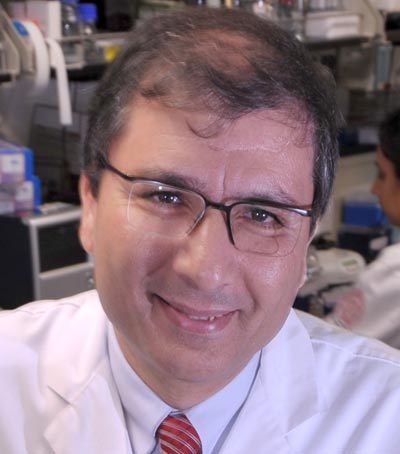
Dr Lotfi Chouchane
WCMC Qatar joins global fight against cancer
Doha, January 21, 2013
Weill Cornell Medical College in Qatar (WCMC-Q) is representing Qatar and the Mena region on an international consortium dedicated to fighting cancer.
The Worldwide Immunoscore Consortium (WIC), led by Drs Jerome Galon from France and Bernard Fox from the US, is an initiative of the Society for Immunotherapy of Cancer (SITC) and is currently researching how to improve the accuracy of colon cancer prognoses.
WCMC-Q is now organising a symposium in April, comprising representatives from 17 countries and 23 medical centers, about research into colon cancer.
Dr Lotfi Chouchane, representative of Qatar in SITC and in WIC and WCMC-Q’s assistant dean for basic science curriculum and a professor of genetic medicine, microbiology and immunology, said: “The consortium is made up of world-class medical institutions and centers so for WCMC-Q to have been invited to join really demonstrates the reputation that the college has developed, specifically in its research and translational work.
“It is also an honor for WCMC-Q as we are representing Qatar and the entire MENA region, showing that the Qatari leadership’s ambition for the country to become a regional hub for education and research is coming to fruition.”
The WIC is currently investigating whether T-lymphocytes or T-cells (which are a type of white blood cell) can help improve the accuracy of the prognosis for a patient with colon cancer. Essentially, doctors currently make prognoses based on the size of the tumor, its aggressiveness and whether the lymph nodes have been invaded among other factors.
But research suggests that determining whether T-lymphocytes have infiltrated the tumor is a more reliable approach: the more T-cells that have infiltrated the tumor the better the prognosis for the patient.
This could mean that doctors do not have to administer as much chemotherapy or radiation therapy. Alternatively, it could lead to doctors increasing the dosage of medication if T-cells are found not to have invaded the tumor.
Further into the future the research could also open the door to drugs being developed that encourage the infiltration of T-cells in tumors.
Already investigators are using immunoscores to examine this question and evaluate whether cancer vaccines and other immunotherapies alone or combined with standard therapies can increase the number of T-cells that can recognize and infiltrate a tumor.
Firstly, however, the research has to be conclusively proved so as to persuade bodies like the Food and Drug Administration in the U.S to endorse the information and the use of T-lymphocyte tests as a means of prognosis.
To this end a worldwide study of 6,000 patients with colon cancer is to be conducted. WCMC-Q will be responsible for gathering the results from the Mena region.
Following tests on colon cancer tumors, the researchers will turn their attention to breast cancer.
Dr Chouchane said: “If the research proves the theories to be correct it could have far-reaching benefits, improving the lives of those undergoing treatment for cancerous tumors of the colon and potentially saving thousands of lives if new drugs can be developed.”
“If the same results can be found in breast cancer tumors – and possibly other types of cancer - the implications are exponential,” he added.
Weill Cornell Medical College in Qatar is a partnership between Cornell University and Qatar Foundation. – TradeArabia News Service







